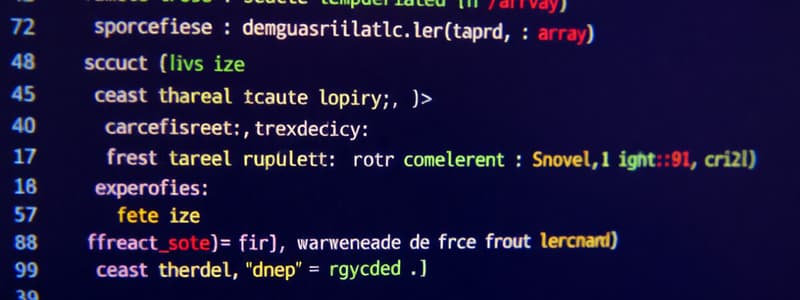Podcast
Questions and Answers
What is the correct way to declare a character array for card suits?
What is the correct way to declare a character array for card suits?
- char SUITS[4];
- char SUITS[] = { 'C', 'D', 'H', 'S' }; (correct)
- char SUITS = { 'C', 'D', 'H', 'S' };
- char *SUITS = { 'C', 'D', 'H', 'S' };
What will happen if the length of an array is specified differently from the number of initializers?
What will happen if the length of an array is specified differently from the number of initializers?
- The last provided value will be replicated for the remaining elements. (correct)
- Only the specified length will be initialized.
- The compiler will throw an error.
- The array will not be initialized at all.
Which of the following correctly initializes an array of structs?
Which of the following correctly initializes an array of structs?
- Card hand[2] = { { '2', 'C', 0, &drawTwoCards }, { '3', 'D', 0, &drawThreeCards } }; (correct)
- Card hand[] = { { '2', 'C', 0 }, { '2', 'D', 0 } };
- Card hand[] = { '2', 'C', 0, &drawTwoCards };
- Card hand[] = { { '2', 'C' }, { '3', 'D' }, { '4', 'H' }, { '5', 'S', 0, &drawFiveCards } };
What types of data can be included in a struct initializer?
What types of data can be included in a struct initializer?
Which of the following statements is true regarding the initialization of simple data types?
Which of the following statements is true regarding the initialization of simple data types?
What is the purpose of the function pointer in a struct initialization?
What is the purpose of the function pointer in a struct initialization?
How many elements are present in the initialized array for the card example provided?
How many elements are present in the initialized array for the card example provided?
What will be the last element's value if it is not explicitly initialized in struct initialization?
What will be the last element's value if it is not explicitly initialized in struct initialization?
In the provided struct Card, which data types are used for its members?
In the provided struct Card, which data types are used for its members?
What is the correct syntax for defining a struct type in C?
What is the correct syntax for defining a struct type in C?
What will be the initial value of the 'isDealt' member in the last two elements of the 'hand' array?
What will be the initial value of the 'isDealt' member in the last two elements of the 'hand' array?
What happens to the unspecified elements of an array if a size is declared but fewer initializers are given?
What happens to the unspecified elements of an array if a size is declared but fewer initializers are given?
How many parameters are in the struct initializer for the 'Card' type when it's declared as an array?
How many parameters are in the struct initializer for the 'Card' type when it's declared as an array?
In an array of structs, what is the correct way to reference a member of the struct for its first element?
In an array of structs, what is the correct way to reference a member of the struct for its first element?
What is the purpose of function pointers in the struct initialization for type 'Card'?
What is the purpose of function pointers in the struct initialization for type 'Card'?
If you attempt to initialize 'SUITS' with a string instead of characters, what will happen?
If you attempt to initialize 'SUITS' with a string instead of characters, what will happen?
In the definition of an array of structs, what must match the order of the elements during initialization?
In the definition of an array of structs, what must match the order of the elements during initialization?
If 'nStudents' is declared as 'long nStudents = 50;', what is its data type?
If 'nStudents' is declared as 'long nStudents = 50;', what is its data type?
Which character represents the suit of a card in the given struct definition?
Which character represents the suit of a card in the given struct definition?
What data type is used for the variable 'strPrompt' in the initialization example?
What data type is used for the variable 'strPrompt' in the initialization example?
Flashcards
Initializing arrays of structs
Initializing arrays of structs
Initializing arrays where each element is a struct, and each element of the struct is initialized using a corresponding value in the initializer list.
Initializing arrays
Initializing arrays
Assigning values to array elements in a definitive manner.
Array Initialization
Array Initialization
Manually setting the value of array elements. If a size is not specified, the number of values will be used.
Struct Initialization
Struct Initialization
Signup and view all the flashcards
Function Pointer
Function Pointer
Signup and view all the flashcards
Array size inference
Array size inference
Signup and view all the flashcards
Repeating last value
Repeating last value
Signup and view all the flashcards
Data Type in initializer
Data Type in initializer
Signup and view all the flashcards
Multiple data types in initializer
Multiple data types in initializer
Signup and view all the flashcards
Simple variable initialization
Simple variable initialization
Signup and view all the flashcards
What is the key difference between initializing simple variables and arrays?
What is the key difference between initializing simple variables and arrays?
Signup and view all the flashcards
How is the size of an array determined during initialization?
How is the size of an array determined during initialization?
Signup and view all the flashcards
Array initialization with different size
Array initialization with different size
Signup and view all the flashcards
Initializing structs
Initializing structs
Signup and view all the flashcards
Data types in struct initializers
Data types in struct initializers
Signup and view all the flashcards
Function pointer in struct initialization
Function pointer in struct initialization
Signup and view all the flashcards
Example of struct initialization with function pointer
Example of struct initialization with function pointer
Signup and view all the flashcards
What is the purpose of initializing arrays of structs?
What is the purpose of initializing arrays of structs?
Signup and view all the flashcards
How do you access values in an initialized array of structs?
How do you access values in an initialized array of structs?
Signup and view all the flashcards
Study Notes
C Programming: Initializing Arrays of Structs
-
Initializing simple data types is straightforward. Examples include
long nStudents = 50;,char *strPrompt = "Welcome!";, andint nCourse = 3;. -
Arrays can be initialized with multiple values. For example,
char *cards[] = {"AC", "2C", "3C", ..., "KS"};has 52 elements. -
The size of an array can often be inferred from the number of initialization elements:
char SUITS[] = {'C', 'D', 'H', 'S'};creates an array of 4 elements. -
Arrays can be initialized with explicit sizes even if inferring the size is possible. For example
char SUITS[4] = {'C','D','H','S'}. -
If you specify an array's length larger than the initial values, the remaining elements will be filled with the last initialized value. For example,
char inHand[53] = {0};results ininHandfilled with zeros. -
Structs can also be initialized. The initialization values must be in the same order as the members of the struct. For example:
typedef struct { char *rank; char suit; int isDealt; void (*pfuncEffect)( Card *pTopCard ); } Card;can be initializedCard myCard = { “2″, 'C', 0, &drawTwoCards }; -
Arrays of structs are initialized by nesting the individual struct initializations. For example
Card hand[] = { {“2″, 'C', 0, &drawTwoCards },
{ "2", 'D', 0, &drawTwoCards },
{ “2″, `H′, 0, &drawTwoCards },
{ "2", 'S', 0, &drawTwoCards },
{ "Q", 'S', 0, &drawFiveCards },
{ “8″, `C′, 0, &changeSuit },
{ "3", 'S', 0, NULL },
{ "4", 'S', 0, NULL }
};
Studying That Suits You
Use AI to generate personalized quizzes and flashcards to suit your learning preferences.




